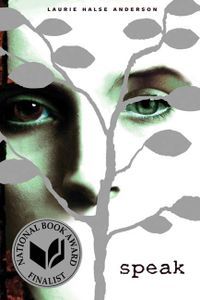Even I, one of its biggest proponents, get frustrated with YA lit from time to time. Among my complaints: not enough standalone novels; too many love triangles; an overabundance of manic pixie dream girls; too much dystopia. But then, there are the gems. There are the writers who aren’t afraid to tackle hard topics, sticky ones, misunderstood ones and the books that you just can’t stop thinking about for days, weeks, or years after reading them. A melancholic person by nature, I am drawn to these books: the ones that hit closest to my painful spots, the bruises on my psyche or ego that go back to the time when I was their target audience, the books that personalize the painful spots in our history on a small or large scale, the ones that explore the problems of our present culture. These are the five-star books that I recommend to people who are interested in the so-called tough topics everyone finds difficult to talk honestly about, the people I just know would love this kind of YA as much as I do if they gave the less mainstream, less hyped, (mostly) non-movie adapted titles a go. They are novels that trigger strong responses and provide insight into oft-misunderstood or overlooked modern experiences, or a fresh perspective on well-trod historical territory. Generally, I consider it a shame that they’re stuck with the YA designation because of how it limits them. (Note: While this post doesn’t necessarily require a trigger warning, I trust you to know your limits and read what you’re comfortable with in relation to your own life experiences.) Date Rape & Rape Culture Speak by Laurie Halse Anderson (Bonus Twilight tie-in: The movie adaptation stars Kristen Stewart.) Thirteen Reasons Why by Jay Asher Feminism Beauty Queens by Libba Bray The Disreputable History of Frankie Landau-Banks by E. Lockhart History The Book Thief by Markus Zusak Chains by Laurie Halse Anderson Realistic Girl Friendships The Gemma Doyle trilogy by Libba Bray The Diviners by Libba Bray Before I Fall by Lauren Oliver Eating Disorders Wintergirls by Laurie Halse Anderson Sadness is important. I don’t encourage wallowing by any means (okay, maybe sometimes I do), but I do believe that what makes us feel bad helps us understand ourselves better if we’ll just look at it a little more closely instead of brushing it aside or refusing to read it. Even—or perhaps especially—bad feelings teach us things we need to know, and crushingly depressing books provide opportunities to practice empathy, that quality so essential to being a decent human being. That’s why fiction is so necessary: it’s a safe space to feel feelings and reflect on them, like therapy, only more interesting. So why does YA lit matter to you? Because it just might make you a better person. Share your recommendations, in these categories or others, in the comments.
Sign up for our newsletter to have the best of Book Riot delivered straight to your inbox every two weeks. No spam. We promise.
